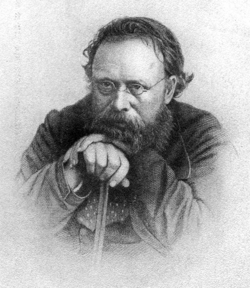The
Works of P. J. Proudhon.
Volume I.
What is Property?
Published and Sold by
Benj. R. Tucker, Princeton, Mass.
1876.
What is Property?
First Memoir.
An inquiry into the principle of right
and of government.
by
P. J. Proudhon.
Adversus hostem aeter1ta auctoritas esto.
Against the enemy, revendication is eternal.
Law of the Twelve Tables.
Translated from the French by
Benj. R. Tucker.
Published and Sold by
Benj. R. Tucker, Princeton, Mass.
1876.
Cambridge:
Press of John Wilson & Son.
Contents.
First Memoir.
- Method pursued in this Work.—The Idea of a Revolution
11
- Property considered as a Natural Right.—Occupation and Civil Law as Efficient Bases of Property.—Definitions
43 - § 1. Property as a Natural Right
44 - § 2. Occupation as the Title to Property
54 - § 3. Civil Law as the Foundation and Sanction of Property
70
- Labor as the Efficient Cause of the Domain of Property
84 - § 1. The Land cannot be appropriated
88 - § 2. Universal Consent no Justification of Property
93 - § 3. Prescription gives no Title to Property.
94 - § 4. Labor.—That Labor has no Inherent Power to appropriate Natural Wealth
103 - § 5. That Labor leads to Equality of Property
110 - § 6. That in Society all Wages are Equal
121 - § 7. That Inequality of Powers is the Necessary Condition of Equality of Fortunes
128 - § 8. That, from the stand-point of Justice, Labor destroys Property
148
- That Property is Impossible
151 - Demonstration. Axiom.
Property is the Right of Increase claimed by the Proprietor over any thing which he has stamped as his own153 - First Proposition.
Property is Impossible, because it demands Something for Nothing159 - Second Proposition.
Property is Impossible, because, wherever it exists, Production costs more than it is worth168 - Third Proposition.
Property is Impossible, because, with a given Capital, Production is proportional to Labor, not to Property172 - Fourth Proposition.
Property is Impossible, because it is Homicide177 - Fifth Proposition.
Property is Impossible, because, if it exists, Society devours itself183 - Appendix to the Fifth Proposition
195 - Sixth Proposition.
Property is Impossible, because it is the Mother of Tyranny207 - Seventh Proposition.
Property is Impossible, because, in consuming its Receipts, it loses them; in hoarding them, it nullifies them; and, in using them as Capital, it turns them against Production209 - Eighth Proposition.
Property is Impossible, because its Power of Accumulation is infinite, and is exercised only over Finite Quantities215 - Ninth Proposition.
Property is Impossible, because it is powerless against Property217 - Tenth Proposition.
Property is Impossible, because it is the Negation of Equality222
- Psychological Exposition of the Idea of Justice and Injustice, and a Determination of the Principle of Government and of Right
224
Part I.
- § 1. Of the Moral Sense in Man and the Animals
224 - § 2. Of the First and Second Degrees of Sociability
230 - § 3. Of the Third Degree of Sociability
238
Part II.
- § 1. Of the Causes of our Mistakes. The Origin of Property
250 - § 2. Characteristics of Communism and of Property
259 - § 3. Determination of the Third Form of Society. Conclusion
280
- Letter to M. Blanqui on Property
291
![]()
![]() This work is a translation and has a separate copyright status to the applicable copyright protections of the original content.
This work is a translation and has a separate copyright status to the applicable copyright protections of the original content.
| Original: |
This work was published before January 1, 1929, and is in the public domain worldwide because the author died at least 100 years ago.
Public domainPublic domainfalsefalse |
|---|---|
| Translation: |
This work is in the public domain in the United States because it was published before January 1, 1929. The longest-living author of this work died in 1939, so this work is in the public domain in countries and areas where the copyright term is the author's life plus 84 years or less. This work may be in the public domain in countries and areas with longer native copyright terms that apply the rule of the shorter term to foreign works.
Public domainPublic domainfalsefalse |
